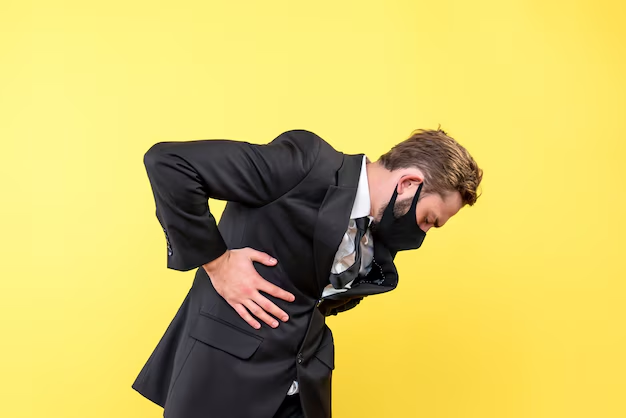The question, “Can constipation cause back pain?” is more common than you might think. Constipation is a digestive issue that affects millions worldwide, but its impact can extend beyond the gut. One surprising and often misunderstood connection is the relationship between constipation and back pain. This pain can manifest in various parts of the back, often confusing those affected. Understanding this link can help address underlying issues effectively.
Constipation-related back pain arises due to several mechanisms, including pressure on nerves, bloating, and inflammation. Symptoms can range from mild discomfort to severe, localized pain. In this article, we’ll explore how constipation can lead to back pain, diving into the causes, types, and preventive strategies to manage these symptoms.
What Is Constipation?
Constipation occurs when bowel movements become infrequent or difficult to pass. Medically, it’s defined as having fewer than three bowel movements per week. The condition can lead to hard, dry stools that are painful to expel.
Common symptoms of constipation include:
- Straining during bowel movements.
- A sense of incomplete evacuation.
- Abdominal bloating and discomfort.
These symptoms can sometimes escalate, triggering discomfort in areas beyond the digestive tract, including the back.
How Common Is Constipation?
Constipation is a prevalent condition, affecting about 16% of adults globally. In older populations, particularly those over 60, the prevalence can rise to over 33%. Factors contributing to constipation include poor dietary habits, low fluid intake, sedentary lifestyles, and certain medications. Its widespread occurrence underscores the importance of understanding its potential effects on the body.
How Does Constipation Causes Back Pain?
Constipation can indirectly cause back pain through various mechanisms:
- Nerve Compression: When stool builds up in the colon, it can create pressure on surrounding nerves. This pressure can radiate to the back, leading to discomfort or sharp pain.
- Bloating and Gas: Accumulated gas from delayed digestion can exert pressure on the abdominal cavity. This pressure may affect the spine, leading to postural changes or nerve irritation.
- Inflammation: Chronic constipation may lead to localized inflammation, affecting muscles and tissues in the back.
To Read: Is Turmeric Good for Inflammation?
Can Constipation Cause Upper Back Pain?
Upper back pain due to constipation is less common but can occur. When bloating and gas push upwards, they can affect the diaphragm and surrounding areas. This pressure can occasionally extend to the upper back, particularly in severe cases of gastrointestinal distress.
Can Constipation Cause Lower Back Pain?
Lower back pain is a more frequent symptom associated with constipation. The build-up of stool and gas in the intestines can exert direct pressure on the lower spine. This pressure can strain surrounding muscles and tissues, leading to dull, aching pain or sharp, localized discomfort.
Can Constipation and Gas Cause Back Pain?

Yes, constipation combined with gas can amplify back pain. Gas builds up in the intestines when digestion slows, causing bloating. This bloating can push against the spine and adjacent muscles, resulting in discomfort or cramping. In severe cases, the pain may mimic that of musculoskeletal issues.
Can Constipation Cause Back Pain Near Kidneys?
Constipation-related pain near the kidneys often stems from referred pain. When the colon is full, it can press against organs like the kidneys. This pressure might create discomfort that feels like kidney pain but originates in the digestive system.
Can Constipation Cause Back Pain Sciatica?
Yes, sciatica pain can be exacerbated by constipation. The sciatic nerve runs through the lower back and legs. Pressure from a distended colon or gas can irritate this nerve, leading to radiating pain along its path. Managing constipation can significantly reduce this type of discomfort.
Can Constipation Affect the Spine?
Constipation can impact spinal health over time. Chronic bloating and poor posture caused by discomfort can strain the spine. Additionally, prolonged sitting or hunching due to abdominal pain can lead to postural misalignments, indirectly affecting spinal health.
How to Relieve Back Pain from Constipation?
If constipation is causing back pain, immediate relief is essential to improve comfort. Here are some steps you can take:

- Hydrate: Drink plenty of water to soften stools and ease bowel movements.
- Gentle Movement: Walking or mild stretching can stimulate bowel activity.
- Apply Heat: A heating pad on your lower back can reduce muscle tension and alleviate pain.
- Adjust Posture: Sitting upright or in a squatting position during bowel movements can help.
- Over-the-Counter Laxatives: Mild stool softeners or fiber supplements may provide temporary relief.
These measures target both the digestive system and the associated discomfort, offering quick and effective solutions.
Constipation Back Pain Treatment
When at-home remedies aren’t enough, medical treatments can address both constipation and its associated back pain:
- Fiber Supplements: Products like psyllium or methylcellulose can bulk up stool and promote bowel movements.
- Laxatives: Osmotic or stimulant laxatives may be prescribed for short-term relief.
- Prescription Medications: Drugs like lubiprostone or linaclotide may be recommended for chronic cases.
- Pain Relievers: Nonsteroidal anti-inflammatory drugs (NSAIDs) can alleviate back pain but should be used cautiously.
For persistent issues, consulting a healthcare professional ensures proper diagnosis and targeted treatment.
Exercises for Constipation Back Pain
Gentle exercises can reduce back pain and stimulate bowel movements. Here are some effective options:
- Child’s Pose: This yoga pose stretches the lower back and eases tension.
- Knee-to-Chest Stretch: Lying on your back, pull one knee to your chest to relieve pressure on the spine.
- Cat-Cow Pose: Alternate between arching and rounding your back to improve mobility and digestion.
- Pelvic Tilts: Strengthen your core and lower back by tilting your pelvis while lying flat.
- Walking: A simple 15-minute walk can activate the digestive system.
Consistency with these exercises can provide long-term relief.
Foods to Relieve Constipation and Back Pain
Diet plays a crucial role in managing constipation and its associated pain. Include these high-fiber and hydration-friendly foods:
- Fruits: Apples, pears, and prunes are excellent sources of fiber and natural laxatives.
- Vegetables: Leafy greens, broccoli, and carrots improve digestion.
- Whole Grains: Opt for brown rice, oats, and whole wheat bread for sustained bowel health.
- Hydration: Drink plenty of water and include hydrating foods like cucumbers and watermelon.
- Probiotics: Yogurt and fermented foods like kimchi can balance gut bacteria.
Avoid processed foods and excessive caffeine, as they can worsen constipation.
Home Remedies for Constipation and Back Pain
Natural remedies can offer relief without the need for medications. Consider these options:
- Herbal Teas: Chamomile and peppermint tea can relax the digestive tract and reduce bloating.
- Warm Baths: Soaking in warm water eases muscle tension in the back.
- Massage: Gentle abdominal massages can stimulate bowel activity.
- Castor Oil: A small amount taken orally may act as a natural laxative.
- Epsom Salt: Adding Epsom salt to a bath can relax muscles and aid detoxification.
These remedies are safe for most people but should be used cautiously in severe cases.
Preventing Constipation-Related Back Pain
Lifestyle Tips to Avoid Constipation
Prevention is better than cure. Adopting these lifestyle habits can help avoid constipation and related back pain:
- Stay Active: Regular exercise keeps your digestive system moving.
- Eat Fiber-Rich Foods: Include fruits, vegetables, and whole grains in your meals.
- Hydrate: Drink at least 8 glasses of water daily.
- Avoid Overeating: Large meals can slow digestion and lead to bloating.
- Limit Stress: High stress levels can disrupt normal bowel movements.
Consistency with these habits ensures long-term digestive health.
To Read: Is Green Tea High in Caffeine? A Detailed Guide
When to See a Doctor
In some cases, constipation and back pain may signal a more serious issue. Seek medical attention if you experience:
- Blood in stools or persistent abdominal pain.
- Sudden, severe back pain that doesn’t improve.
- Unexplained weight loss or loss of appetite.
- Symptoms lasting more than two weeks despite home treatments.
Early intervention prevents complications and ensures effective management of the root cause.
FAQs
Where is constipation pain felt in the back?
Constipation pain is often felt in the lower back due to pressure on nerves and surrounding tissues. It may also cause a general achy sensation or cramps in the middle and upper back.
Can constipation cause back pain near the kidneys?
Yes, constipation can cause back pain near the kidneys as the buildup of stool in the colon may exert pressure on nearby organs, creating discomfort and pain in the lower back area.
Can constipation cause back pain and sciatica?
Constipation can aggravate sciatica if the buildup of stool or gas presses on the sciatic nerve. This may result in pain radiating from the lower back to the legs, worsening existing nerve-related conditions.
Can constipation affect the spine?
Constipation can indirectly affect the spine by altering posture due to discomfort or bloating. This may lead to strain on spinal muscles, contributing to localized or radiating back pain.
Conclusion
The connection between constipation and back pain is undeniable, as the strain and pressure caused by digestive issues can extend beyond the gut. To answer the question, “Can constipation cause back pain?”—yes, it absolutely can. This discomfort often arises from nerve compression, bloating, and changes in posture, all linked to the build-up of stool in the intestines.
Understanding this relationship is key to finding relief. Whether through dietary adjustments, exercise, or medical treatments, addressing constipation can significantly reduce back pain. However, persistent or severe symptoms should not be ignored, as they might indicate an underlying issue. By taking proactive measures and consulting a healthcare provider when needed, you can effectively manage both conditions and improve your quality of life.

